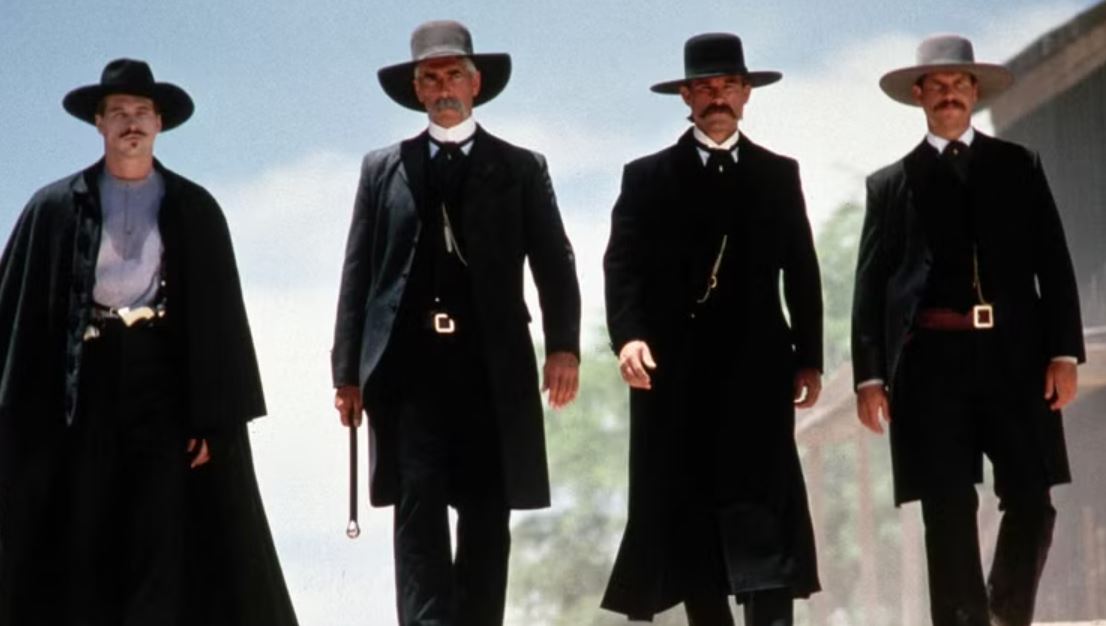The mythos of the Old West lawman Wyatt Earp has never been far from the truth, making him a magnet for the Western screen. Earp’s legendary story has the ideal elements: outlaws, lawmen, loyalty, justice, and revenge — a combination that Kurt Russell’s 1993 film Tombstone and Kevin Costner’s Wyatt Earp a year later both wrestled with in wildly different fashions. The two Westerns launched a rivalry unlike any other, offering moviegoers differing interpretations of the same man and the legendary Gunfight at the O.K. Corral. Though Wyatt Earp aimed to preserve the integrity of its subject matter, it was Tombstone’s willful willingness to take creative liberties that ultimately won the day. By prioritizing myth over accuracy, Tombstone struck a chord with audiences, delivering a Western that felt more familiar in spirit, if not in fact.
‘Tombstone’ and ‘Wyatt Earp’ Provided a Rivalry of the Old West Mythology

Often, rival productions in Hollywood can make, break, or even enhance films’ performances. Barbenheimer, the 2023 cultural phenomenon, was a perfect marketing campaign for its two films. For Tombstone and Wyatt Earp, their releases months apart turned them into competing visions of the same story. Directed by George P. Cosmatos (though it is widely speculated that Kurt Russell directed most scenes), Tombstone took on a streamlined narrative that threw its focus on the events leading to the infamous Gunfight at the O.K. Corral and the immediate aftermath. Lawrence Kasdan’s Wyatt Earp starring Kevin Costner, on the other hand, went for an expansive biopic covering the lawman’s life from youth to old age.
Box office success and fan reactions quickly favored Tombstone’s dramatic and compact approach. Kurt Russell’s gritty, magnetic portrayal of Earp and a leaner script offered audiences a tightly packed tale brimming with tension, morality, and vengeance. In contrast, Costner, who passed on a major role in Tombstone for Wyatt Earp, made a lengthier, historically faithful presentation that was more reflective on the lawman’s legacy, but couldn’t quite match Tombstone’s excitement, with critics and audiences split on Costner’s slower-paced, character-driven saga. On Rotten Tomatoes, for instance, Tombstone commands a 74% score compared to Wyatt Earp’s measly 31%.
Why ‘Tombstone’s Creative Decisions Make It a Better Western Than ‘Wyatt Earp’

While both Tombstone and Wyatt Earp take different approaches to what to cover about the legendary lawman’s life, at their heart lies the Gunfight at the O.K. Corral. For many, this showdown is what encapsulates Wyatt Earp’s legacy, as it captures the drama surrounding the clamor for justice attributed to him in a lawless land. Kevin Costner’s Wyatt Earp depicted the Gunfight at the O.K. Corral with historical accuracy that mirrored the narrow space within which it took place and the brief but intense exchange it was, covering the clash in under one minute on-screen. Though authentic, this restrained version of the gunfight lacked the grandiosity audiences might expect from a climactic Western shootout.
In contrast, Tombstone upped the ante with the legendary tale, portraying the O.K. Corral sequence as a sprawling cinematic shootout spanning a larger area with bullets flying and simmering tension that transformed the moment into a spectacle and provoked imagination of what frontier justice looked like. While not accurate, it danced to the mythical tune already in circulation about the legends involved, providing a more memorable cinematic experience of the two. Going beyond the gunfight, Tombstone also took more liberties with its characters and relationships. Among them, Val Kilmer’s Doc Holliday was depicted with a refinement that historical accounts do not achieve, presenting him as wittier and more philosophical. Wyatt Earp, on the other hand, remained committed to a grittier and more reserved Holliday, which took away the allure of Kilmer’s character and performance that stole scenes in Tombstone.
Russell and Costner bring different strengths to Wyatt Earp’s role, with Russell embodying a rugged, almost silent grit, while Costner portrays him with layers of introspection. But Russell’s performance in service to the film’s pace and focus on action gives Tombstone an adrenaline-fueled quality that Costner’s more contemplative take just can’t match in Wyatt Earp. The tighter Tombstone, combined with Russell’s intensity, compelling allowances with historical accuracy, resulted in a Western that feels timeless and more about capturing a feeling than spelling out every detail of Earp’s life.
